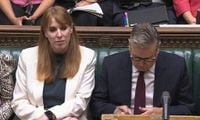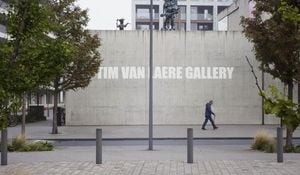Angela Rayner, the United Kingdom’s Deputy Prime Minister, is currently at the center of a political firestorm after admitting to underpaying stamp duty on her £800,000 seaside flat in Hove—a misstep that has triggered not just a formal ethics investigation but also a wave of public backlash, including vandalism at her property. The controversy, which has unfolded rapidly over the past two weeks, now threatens to reshape the political landscape for both Rayner and her party as they await the findings of an independent ethics adviser.
The trouble began with the revelation that Rayner, who purchased the Hove flat in May 2025 using proceeds from selling her stake in a family home in Ashton-under-Lyne, had saved approximately £40,000 in stamp duty. This saving was the result of declaring the Hove property as her main home, rather than paying the higher rate typically reserved for additional property purchases, according to The Daily Telegraph and corroborated by BBC News.
Rayner’s explanation for the error has been consistent: she relied on what she believed to be sound legal advice, which ultimately failed to account for the complex arrangements surrounding her family’s living situation and her son’s trust. “I've been in shock, really, because I thought I'd done everything properly, and I relied on the advice that I received and I'm devastated because I've always upheld the rules and always have done,” Rayner told Sky News. She emphasized that the mistake was unintentional, rooted in the intricacies of a trust set up for her son, who has special educational needs, after a court-ordered financial award in 2020.
The timeline of events paints a picture of a politician caught between personal responsibilities and public scrutiny. In April 2016, Rayner and her then-husband Mark purchased the family home in Ashton-under-Lyne. By 2020, a trust was established to manage a financial award for their son. During their divorce in 2023, both parents transferred shares of the home to the trust, and in January 2025, Rayner sold her remaining stake, receiving around £162,500. She used this sum, along with a mortgage, to buy the Hove flat in May 2025. On legal advice, she paid only the standard rate of stamp duty at the time.
The issue burst into the public eye on August 24, 2025, when The Mail on Sunday and Sun on Sunday reported on her purchase, prompting immediate calls from the Conservative Party for clarity regarding her council tax arrangements. Days later, The Daily Telegraph detailed the stamp duty savings, and the Tories formally requested an investigation by Sir Laurie Magnus, the Prime Minister’s independent ethics adviser. Rayner quickly commissioned her own legal review and, after a court order restricting disclosure was lifted on September 1, she contacted HMRC and referred herself for investigation.
On September 3, Rayner publicly admitted she should have paid the higher rate of stamp duty. She denied any attempt to deliberately dodge tax, stating the initial legal advice “failed to properly take account” of her tax liability due to the nature of her son’s trust. “I deeply regret the error,” she said, adding that she has “vowed to repay any tax owed to HMRC.”
The fallout was swift and severe. Graffiti branding her a “Tax Evader” appeared on the wall outside her Hove flat, on a construction chipboard nearby, and even on pavements in the vicinity. One message read, “Rayner Sold British Girls 4 Votes,” a reference that remains unexplained but underscores the intensity of the backlash. The vandalism drew condemnation from across the political spectrum. Labour leader Keir Starmer denounced the acts “in the strongest possible terms,” emphasizing that “whatever scrutiny our parliamentarians may face, it is appalling that their private homes should be targeted in this way.” A Downing Street spokesperson echoed this sentiment, while also stating that Starmer retains “full confidence” in Rayner, though he declined to guarantee her position for the remainder of the Parliament.
Support for Rayner has come from several Labour colleagues, most notably Chancellor Rachel Reeves. “She is a good friend and colleague, she has accepted the right stamp duty wasn’t paid. That was an error, that was a mistake—she is working hard now to rectify that,” Reeves told reporters. Rayner herself has acknowledged considering resignation, confiding in her family and her ex-husband, who she described as “an incredibly supportive person because he knows that all I’ve done is try and support my family and help them.”
Yet, criticism persists. The leader of the opposition, Kemi Badenoch, labeled Starmer’s refusal to commit to sacking Rayner if found in breach of the ministerial code as “hypocrisy,” pointing out that the crux of the matter is Rayner’s own admission of underpaying stamp duty. The Conservatives and Reform UK have both called for her resignation, arguing that the integrity of public office is at stake.
As of September 3, 2025, the government remains in a holding pattern, awaiting the findings of Sir Laurie Magnus. According to BBC News, the report could be published as early as September 6, potentially bringing resolution to a saga that has gripped Westminster and the public alike. The outcome could determine not only Rayner’s political future but also set a precedent for how such cases are handled in the future.
The controversy has also highlighted the complexities faced by public figures navigating personal and financial responsibilities under the unforgiving lens of public scrutiny. Rayner’s situation—balancing the needs of a disabled child, the legal intricacies of trusts, and the pressures of high office—has resonated with some, while others see it as a test of accountability and transparency in government.
For now, all eyes remain on the independent ethics adviser’s report. Whether Rayner will weather the storm or be compelled to step down, the case has already left a mark on the political landscape, raising questions about the intersection of personal circumstance, legal advice, and public duty. The coming days promise to be decisive, not just for Angela Rayner, but for the standards expected of Britain’s public officials.






